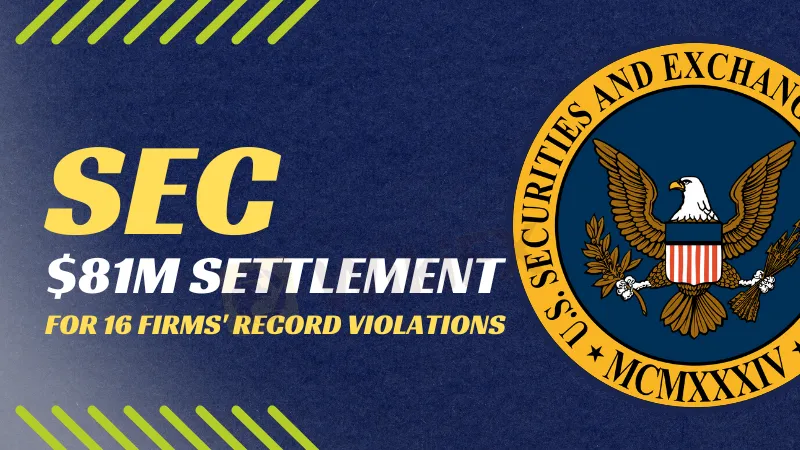简体中文
繁體中文
English
Pусский
日本語
ภาษาไทย
Tiếng Việt
Bahasa Indonesia
Español
हिन्दी
Filippiiniläinen
Français
Deutsch
Português
Türkçe
한국어
العربية
SEC: $81M Settlement for 16 Firms' Record Violations
Abstract:SEC enforces $81M fines on 16 financial firms for failing to preserve key electronic communications, highlighting widespread industry compliance issues.

The Securities and Exchange Commission (SEC) took a significant step in enforcing By accusing 16 prominent financial institutions of failing to retain and preserve important electronic communications, the SEC has taken a significant step toward enforcing federal securities laws. Businesses paid over $81 million in civil fines to resolve this enforcement action.
Complete settlement details, involving a variety of firms: The SEC accuses five broker-dealers, seven businesses registered as broker-dealers and investment advisors, and four investment advisers. This spectrum demonstrates the breadth of compliance challenges throughout the industry.
Recognition of Violations and Financial Implications: Each of the companies concerned admitted to violating federal securities laws' recordkeeping restrictions. The cumulative fines of approximately $81 million are a substantial financial consequence of these compliance violations.- Northwestern Mutual businesses, including NMIS, NMIM, and Mason Street, risk a $16.5 million penalty.
- The Guggenheim entities (Guggenheim Securities and GPIM) will pay $15 million.
- Oppenheimer & Co. Inc. has received a $12 million penalty.
- Cambridge Investment Research entities (CIR and CIRA) will pay a total of $10 million.
- A $10 million penalty will also be imposed on Key Investment Services businesses (KIS and KBCM).
- Lincoln Financial has a $8.5 million penalty.
- United States Bancorp Investments, Inc. has been fined $8 million.
- The Huntington Investment Company, known for self-reporting, faces a $1.25 million penalty.
The SEC's Division of Enforcement Director, Gurbir S. Grewal, underlined the significance of these procedures in ensuring recordkeeping compliance, which is necessary for effective supervision and enforcement.
Nature of the Violations and the SEC's Response
The SEC's thorough investigations found that all 16 businesses used unauthorized communication techniques, often referred to as off-channel conversations. Employees inside these organizations were discovered to have talked about business-related problems via personal text messages and other non-sanctioned techniques beginning in 2019 or 2020. These conversations were not maintained as required, potentially impeding SEC investigations.

Employees at all levels were implicated in the infractions, including supervisors and senior managers, showing a systematic problem inside these companies. As a result, the SEC has charged these companies with failing to establish effective supervisory systems to prevent and identify breaches of the Securities Exchange Act of 1934 and the Investment Advisers Act of 1940.
Compliance Measures and Oversight
In addition to the financial penalties, the resolution requires the businesses to stop violating the law and accept censure. In addition, each business must hire independent compliance advisors. These consultants are entrusted with performing extensive examinations of the companies' policies surrounding the retention of electronic communications on personal devices. They will also analyze the businesses' structures for dealing with employee noncompliance with these rules.
The investigations, conducted by dedicated teams from the SEC's New York and Chicago Regional Offices, highlight the agency's persistent commitment to upholding high standards of compliance and integrity in the financial sector.
This enforcement action serves as a sharp reminder to all regulated companies of the crucial necessity of complying with federal recordkeeping standards, which are fundamental to the SEC's goal of safeguarding investors and ensuring fair and efficient markets.
Stay informed with the latest financial news and industry insights. Visit WikiFX Daily News for up-to-date information and expert analysis!

Disclaimer:
The views in this article only represent the author's personal views, and do not constitute investment advice on this platform. This platform does not guarantee the accuracy, completeness and timeliness of the information in the article, and will not be liable for any loss caused by the use of or reliance on the information in the article.
Read more

The Hidden Checklist: Five Unconventional Steps to Vet Your Broker
Forex broker scams continue to evolve, employing new tactics to appear credible and mislead unsuspecting traders. Identifying these fraudulent schemes requires vigilance and strategies beyond the usual advice. Here are five effective methods to help traders assess the legitimacy of a forex broker and avoid potential pitfalls.

SEC Approves Hashdex and Franklin Crypto ETFs on Nasdaq
The SEC has approved crypto index ETFs by Hashdex and Franklin Templeton, including Bitcoin and Ethereum, marking a milestone in crypto asset investment.

North Korean Hackers Steal $1.3bn in Cryptocurrency in 2024
Over $2.2bn in cryptocurrency stolen in 2024, with North Korean hackers accounting for $1.3bn. Discover how cyber theft impacts the evolving crypto landscape.

ASIC Sues Binance Australia Derivatives for Misclassifying Retail Clients
ASIC accuses Binance Australia of misclassifying 500+ retail clients as wholesale, denying key consumer protections for crypto derivatives. Penalties and reforms are underway.
WikiFX Broker
Latest News
ASIC Sues Binance Australia Derivatives for Misclassifying Retail Clients
WikiFX Review: Is FxPro Reliable?
Malaysian-Thai Fraud Syndicate Dismantled, Millions in Losses Reported
Trading frauds topped the list of scams in India- Report Reveals
AIMS Broker Review
The Hidden Checklist: Five Unconventional Steps to Vet Your Broker
Russia to Fully Ban Crypto Mining in 10 Regions Starting January 1, 2025
YAMARKETS' Jingle Bells Christmas Offer!
Why is there so much exposure against PrimeX Capital?
Doo Financial Expands Regulatory Reach with Offshore Licenses in BVI and Cayman Islands
Currency Calculator


